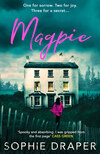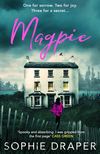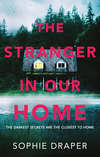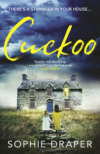Kitabı oku: «Magpie», sayfa 3
CHAPTER 6
CLAIRE – BEFORE
I’ve met the agent, Hardcastle, at a gate marked Private. He’s standing by his car, waiting for me. A man in his later years, short and round, he wears a loud pin-striped suit and he looks like he doesn’t quite belong, here, in rural Derbyshire.
I press the button to lower the window. He leans down to speak to me.
‘Mrs Henderson. Delighted to meet you.’ His voice has the strangled tones of an independent education. ‘Oh, you don’t need to worry about that,’ he adds.
He dismisses the weatherworn sign with one hand. Rust obscures the top half of each letter and it swings in the wind, back and forth, with the inevitable regularity of a metronome.
I follow Hardcastle’s Mercedes in my functional estate. We could have afforded better, but I like my car; I don’t have to worry about every scratch, unlike Duncan, obsessing about his smart Lexus SUV. He has the more reliable vehicle, since he has to go in and out in all weathers to get to work. Hardcastle and I drive one behind the other, bumping along the road parallel to the edge of the reservoir until we turn up into the old village.
I know the village well. I know the whole valley. I’ve lived in the area for so many years. On my right is the dilapidated farmhouse skirted by a straggle of barns. On my left, a sequence of run-down cottages. Some of them face each other like partners in a dance, each house wearing its abandonment with an air of genteel humility – lichen-dusted walls, plants peeping from the gutters, window frames faded and stripped by the sun. The windows all have the same delicate white leaded inserts and the doors, the same peeling blue paint. Even the brickwork is all a matching shade of Georgian herringbone red, warm and welcoming but for its neglect. Gorgeous in the crisp morning sunlight.
It should have lifted my spirits, all this. The evident decay of the village simply adds to its charm. And yet there is no sign of life. Never has been. No washing on the line, no pot plants in the windows. Not even a bowl of water for a cat or a dog. Most houses in the country at least have a cat to keep down the rodents.
I see a ramshackle pair of iron gates with a drive leading into the shadows. There are no cars, not one by a single house, except for us, of course. I’m not sure I like it. The whole village is resolutely derelict. I’ve avoided it before. I hadn’t realised the property would be so close to here. It’s on the far side of the reservoir away from the Barn.
We pass the last house and turn off again, climbing the hill. Hardcastle takes a left, off the lane onto a dead-end track where the tarmac has melted in the heat of last year’s summer. I follow and the grass verge is so overgrown you can’t see past each bend. The trees and hedges grow so tall and dense that the fields above are hidden. Daylight has morphed into dark shadows, bathing the track with the shifting patterns of moving branches, and I jam on the brakes as a squirrel bounds across the lane right in front of me. I have one of those unsettling moments of déjà vu, like I’ve done this before. But I don’t think I’ve been up this way, why would I? That’s good then, I think.
Then we’re there, at last. The cottage.
I feel my heart skip a beat. It’s a wreck. I expected it to be, but I still love it.
To be fair, they did warn me of the state of it: In need of some development. Landlord happy for tenant to make the place their own. Translate that as damp and cold from years of neglect and in need of total renovation. If not tearing down and starting all over again. Not that that’s an option.
It must have been standing empty for several years.
The building sits sideways from the track, with red bricks and white painted windows like all the other houses in the valley. It wears its slouch like a tired old man. I cast my eyes down the slope. You can see the reservoir in the distance, exactly like they’d said. My heart gives another leap. Not too close, but close enough.
I’d promised myself it had to be something located near the Barn, ish, painful though that is. I don’t want Joe to have any excuse to refuse to come with me. He won’t give up his metal detecting and I won’t take him too far from his father, despite all the conflict. I want to reassure him about that. They still need to see each other and I won’t have the money for expensive train and bus fares. Besides, there are so many secluded corners in this valley, old farm buildings and shepherd huts slowly degrading beneath the weight of their own walls, I think it might just work hiding from Duncan in plain sight. I have faith in Joe, he won’t let on if I ask him not to. If I need to. I suck my bottom lip between my teeth.
I park my car beside the estate agent’s and get out. As I follow him up the short, overgrown path, he reminds me of the rent. I lift my head and he smiles at me with the wide-eyed confidence of a salesman who knows he’s already got the deal. We come to a stop and he looks away, restless, like now we’re here, he’s already thinking of the next appointment.
‘Why are they renting and not selling?’ I ask.
Not that I can afford to buy until the divorce comes through. This is only temporary, I tell myself.
‘It’s part of an old estate. The family aren’t prepared to sell. They don’t want to break up the estate.’
I nod. I know about the family. Everybody does. There are a few stories about them, none of them particularly salutary, mostly around unreasonable rules and wilful neglect.
The agent gestures to the view beyond the cottage, over the fields and down the hill. He launches into his spiel.
‘Lovely, isn’t it? The whole valley is subject to a ninety-year-long restrictive covenant, so nothing’s been built, not even a shed, since the Second World War. People pay over a million for those few houses further up the hills …’
His voice trails away. He knows I must be aware of this. He’ll have seen my name and address on the contact form. Wife of, mother of, Mrs Henderson – is that all I am to other people? Even in this day and age, defined by my relationship to men. That’s what you get if you choose to be a full-time mother. Certainly, in this part of the county. Though choose isn’t quite how I’d put it.
Hardcastle steps ahead of me and unlocks the back door, shoving it hard to get it to open. It grinds in a painful way due to the loose stones caught under the bottom of the door.
‘You’ll be hard-pressed to find anything prettier in all of Derbyshire.’
I look up – he’s right, the cottage is very pretty, in a down-at-heel, scruffy kind of way. Shabby chic, that’s how I imagine it could be, picturing it with whimsical fairy lights and vintage candles. But the view down to the reservoir still pulls my eyes. A thin trail of mist slithers out low across the surface and a large bird breaks through. Another and another, a line of geese rising up. Beating wings, open beaks, their gulping cries breaking the peace of the countryside. Their wings pull with a steady rhythm as the mist parts and coils out of place, and the yellow light from a weak sun dances briefly across the water.
The agent smooths his hands down his tie – silk, so much classier than the young man who greeted me at the office. That super-confident smile of his is making my stomach curl.
‘It’s a project, like I said.’ He croons like a jazz singer. ‘It means you’ve got the freedom to decorate exactly as you please. The view is particularly striking from the master bedroom.’
Master bedroom. As if. Judging from the floor plan on the details there’s barely enough space for one double bed and a small cabinet. I contemplate the flaking wooden windows. There’s a second bedroom under the eaves. I might have to take that one, given how tall Joe is. A ‘doer-upper’, cloistered in a long-forgotten valley, the lush slopes the select preserve of one family, a couple of farmers and a handful of rich, obsolete businessmen.
I squeeze past the buddleia bush leaning out across the doorway and duck underneath a hanging basket that trails dead leaves over my head. I eye the drunken shape of the roof, its missing tiles and the grime-encrusted, cracked panes of glass in the door. As I step inside, I see peeling wallpaper and a mustard-yellow 1950s kitchen. This place, I realise, hasn’t been touched for decades. I feel my excitement bubble.
I move into the room and then I spot the ancient red enamelled range. It’s been pushed into an old inglenook fireplace with a blackened beam above, pitted and scorched with age. I run my fingers over the grooves in the wood, peering more closely. There are markings that seem familiar, circles within circles and letters too, a W and AM, carved with a crisp precision that have nothing to do with the natural cracks from the heat. I feel myself falling even deeper in love.
‘What are these?’ I say, fingering the marks.
I know the answer, but it’s something to say. The agent leans forwards.
‘Oh, those are witches’ marks, carvings from long ago, probably from when the house was first built. People did that stuff then to ward off evil spirits. It’s quite common in this part of the county. So you’ll be quite safe here.’
He grins in a rather wolfish way for an older man. Creep, I think. Then he turns towards the back door, pulling out his mobile phone.
‘I’ll let you look around on your own.’
He’s already lost interest, swiping at the screen.
I scan the ceiling. The brochure hadn’t mentioned that the roof leaked or that there was no central heating. I can see pipes running from the side of the range to the sink, then along the wall again and up into the corner through the ceiling. I’m guessing the fire heats the hot water. I daydream of waking early in the morning, heading down the stairs in the freezing cold to stoke the ashes from the night before, piling on the logs to relight the fire in the range and generate some heat. I could put an armchair right in front of it, with that old rag rug Duncan thought I’d thrown away. It would be perfect there under my feet. Flagstones, I see proper giant slabs of flagstone. I’ve always loved the idea of having those.
I wonder if I might even be able to buy the place if and when the family decide to let it go and my divorce comes through.
I feel my anticipation grow. A new routine to take over from the old routines of my life as it was before. I’ve been with Duncan for so long, ever since we were students together at the veterinary school in Nottingham. It’s hard to conceive of a life on my own.
Though, not quite on my own.
Joe has to come with me. I can’t go without Joe.
And Arthur, of course.
It’ll be Duncan left on his own.
CHAPTER 7
CLAIRE – AFTER
I wake. The bedroom is deathly quiet. The kind of silence that plucks the air from your lungs, eyes wide open listening for a creak in the walls, the flutter of birds in the trees, the switch of illicit shoes climbing the stairs.
It’s dark, the air cold upon my skin. I lie on the bed frozen to the mattress, legs bent, one arm under my head, eyelashes brushing against the pillow. I listen, hardly realising that I’m holding my breath until I let it go. My ribs move and I force myself to wriggle my fingers and pull one leg free from under the covers.
I have woken too early, too tense, the nightmare still filling my head. Fear pumps through my veins like a drug. It’s as if the bed, the whole room will implode, swallowing me up, dragging me down into a narrow chimney of thick stone and earth, falling, falling, scrabbling for roots and clumps of soil but unable to grab hold, water gushing through the gaps. I am Alice in her Wonderland, too big for the space, too small to fight back, too disbelieving of my fate, as I’m sucked down into a vortex of my own making.
I gasp and sit up, pulling myself out but into yet another new nightmare.
Joe?
I’m panting, dragging great lungfuls of air into my chest. I reach for the bedside lamp, pick up the clock and cast my eyes around the room. I see the spill of daylight growing through the gap in the curtains. For a moment it all seems strange, an alien place I’ve never seen before. The clock has a new face, the curtains a different pattern. Even the fragile dawn is a strange colour, sharper, cleaner, more luminescent than before.
I exhale and place the clock back on its table. I let the brightness bring me slowly back to life. That’s when the memory taunts me. The memory of my son.
I remember the sweaty, musky scent of him that clings to his unwashed clothes, the way his hair falls in lush waves across his cheeks. I hear his music, the thudding beat asserting his presence in the Barn. I smell the cold air on his coat, the dead leaves under his feet, the ice upon his skin. And something else – a damp, earthy, rotting kind of smell, like mushrooms spawning in the dirt.
I am awake. I must let it go, whatever it is that still pulls me to that dream. I will myself not to think of Joe like that. Instead, I think of the scent of him when he was newborn. That sweet Joe smell, my Joe – no one else’s Joe – nestled in the crook of my arm. His fingernails are soft and peeling at their tips, his knees folded to his chest. His skin is pink and white and blue, the strands of black hair on his skull slick with the soft grease of birthing. That smell.
I squeeze my eyes shut and push the memories away. Are they memories or dreams? I’m not sure. I have a fierce headache that won’t go away. They told me I will have to get used to it, that it’s to be expected after what’s happened. But as I lie here, I can’t even remember who said that or where it was. Only that he’s gone. My Joe.
He didn’t come with me.
I open my eyes, listening for his footsteps just in case.
I betrayed him. I left him behind. It overwhelms me, how I could do that. I can’t let myself think about it, my head hurts trying.
But now I hear something. There are footsteps, after all. I’m sure it must be him. I’ve been texting him all this time, making sure he knows where to go. At last, he’s come home! To our new home. The cottage. I hear a steady, cautious creak upon the stairs. My bedroom door swings open and a shadow reaches out across the floor.
It’s Arthur. The dog. His black head is up, sniffing the air. He pauses as if to check that it’s okay to come in.
He moves again, his three good legs bearing the bulk of his weight as he limps uncertainly towards my bed.
CHAPTER 8
DUNCAN – AFTER
A hand lightly touched his shoulder. Duncan started and the hot coffee burnt his fingers. It was Martin, his face grey and strained, the elasticated plastic hood of his forensic suit pulled down from his head.
‘I’m sorry,’ said Martin. ‘I didn’t mean to make you jump, but you didn’t answer the front doorbell.’
‘I … It’s okay, what did you want?’
‘I wanted to see how you are.’ Martin gestured through the window.
Down by the water, someone had drawn back the door of the main tent. Even at this distance, in the fading light, Duncan could see a glimpse of bare earth, cut away into different layers and trenches. It was a pitted labyrinth of mud and water, flags and poles numbered and labelled to match the records in the control tent.
‘Thank you for your patience with all this, especially in the circumstances.’
Especially in the circumstances. As if Duncan had any choice other than to tolerate the noise and disruption, the complete invasion of his privacy. In a bizarre way, he was almost grateful for that. The Barn felt empty without his family in it. His eyes slid back to the window, to the scene at the bottom of the field laid out like the trenches of the Somme. He nodded, only half aware of what he was doing.
‘Have you eaten?’ Martin said.
Duncan swung back to his friend’s face. With the hood down, he could see Martin’s damp wiry hair, speckled white at the temples, and his eyes, sharp and observant. Even with his obvious fatigue, Martin had the edginess of intellect and experience. Duncan had always respected that, but it also made him wary.
‘No,’ Duncan replied, his stomach rumbling.
Martin produced a couple of plump brown paper bags.
‘From the mess van,’ he said, nodding to the white van outside, with a generator of its own and a stench of fried chips. ‘They do a mean bacon cob.’
Already, Martin was pulling back the flaps of brown paper, tearing open a catering sachet of brown sauce and squeezing it over his food.
Bacon – there was something so vibrant about bacon. The smell of it, the taste of it, the sizzling as it cooks. Claire had been vegetarian. Duncan, too, when they were students. To Claire’s fury, it had been bacon that had broken his resolve, despite all his scruples.
‘Sure,’ said Duncan, giving in to his hunger and moving to join Martin. The two of them sat side by side on the kitchen sofa.
‘I never thanked you properly for looking after our cat,’ said Martin. ‘He’s doing well.’
Martin’s cat had been run over two months ago. Duncan had managed to save it, after wiring the jaw and removing one eye.
‘You’re welcome,’ he said. ‘He was lucky.’
The density of cat casualties never failed to enrage him – a quarter of a million of them each year in the UK, mostly people driving too fast, not caring at all.
‘Well, the wife was hugely relieved. He stays inside now.’
The one eye didn’t leave them with much choice. Duncan didn’t hold with keeping cats inside, but in this case, he’d had to make it absolutely clear.
‘Good,’ he said. The monosyllabic answer was all that he could manage. He took a bite of his cob.
Martin cast his eyes around the room. The heavy swathes of curtain fabric at the full-length windows by the sofa, the matching oversized lamps on the side tables on either end. The designer scented candles had not yet been burnt. It was Claire who was into burning candles. Duncan could see Martin assessing his taste, his wealth. Martin’s family still lived in a three-bed semi on a modern estate the other side of Derby. Some vets earned more than doctors, which spoke volumes for how people valued their pets.
‘You didn’t say much, yesterday.’ It was a question, not a statement. Martin squinted over his roll. ‘I know it was a lot to take in. Bit of a shock, especially … there’s not a huge amount I can tell you at this point, but is there anything you wanted to ask?’
Duncan folded the paper round his roll, tucking it neatly underneath. His eyes half-closed as he thought about it.
‘How was it found?’ he said.
‘Bob Shardlow found the remains, or rather his dog did. They were walking along the shore. It was half-submerged in the mud.’
‘What was Bob doing there? That’s my land on either side of the road, right up to the water. He’s got no business walking his dog there.’
Duncan knew that his annoyance might be seen as unreasonable in the circumstances, but he didn’t care. It seemed to him as if he shouldn’t care. About anything. That way was so much easier.
‘The path on the south side of the reservoir dam is blocked at the moment because of the high water levels and Shardlow had to find an alternative route.’
Duncan didn’t respond. He carried on eating, not looking up. Until:
‘Can you tell me anything about it?’
The body – they were talking about the body.
‘I can’t tell you that, I’m sorry, mate.’ Martin let his words fade away, using the excuse of the food to fall silent.
Duncan nodded – they both ate. For a moment, it was no different to the two of them sitting on the wall outside the school, or lying back against the grass on the slopes behind the swimming baths. It had been six weeks – he still felt numb. This new development was surreal. Duncan let it flow over him. He was aware of Martin watching him from the corner of his eye.
‘I’m okay, really I am.’
Duncan pushed the last of his bacon roll into his mouth and scrunched the paper bag in his fist. He kept his face studiously indifferent.
‘They’re good at their jobs, you know.’ Martin spoke gently. ‘We’ll do our best to keep this as quick and efficient as possible. But we don’t have much choice.’
‘I know.’ Duncan sat with the paper bag still in his fist.
‘I’ll keep an eye on things, I promise.’
‘Thanks.’ Duncan stood up to place the bag in the kitchen bin. His voice lifted. ‘I appreciate that. When do you think you’ll know more?’
‘Hard to tell at this stage. I’ll get an initial report from Forensics tomorrow. We’ll talk to you as soon as we can.’
There was another silence. Duncan moved to the sink. The cold-water tap gushed as he filled a glass, water frothing up and spilling out over the rim.
‘Right, I’m off now.’ Martin slapped Duncan on the back. ‘But I’ll be here again in the morning. You need anything, Duncan, anything at all, or anyone bothers you, you let me know, eh?’
‘Thank you, mate. I appreciate it. And thanks for the food. Have a good evening.’
Duncan turned to lean back against the sink, watching and sipping his drink as Martin left the house. When Martin had gone, he cast his eyes around the room, everything put away in its place, not a speck or a crumb in sight. He’d even had the granite work surfaces repolished. Already. He smoothed his hand across the top of the kitchen island. Claire would have hated it like this, too clinical – like a room at the surgery, that’s what she’d once said. But Duncan could do what he liked now, couldn’t he?
Now that she had gone.



